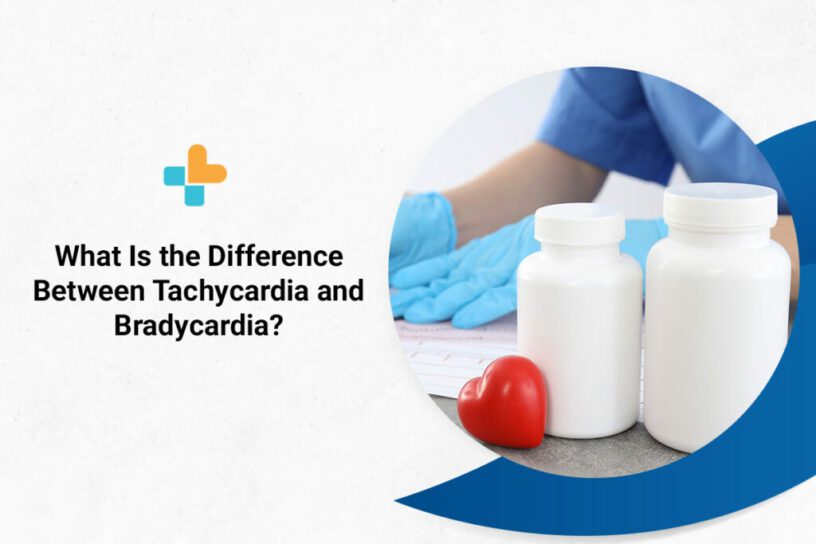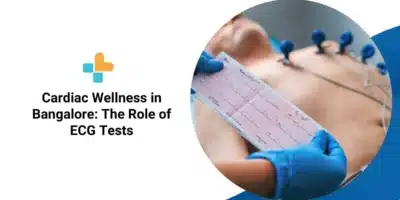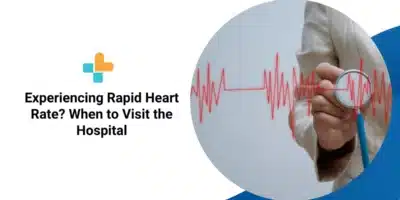Ever feel like your heart is beating too fast or too slow? If you’re going through either, then you need to know the difference between tachycardia and bradycardia and how they’re treated.
A cardiologist or general healthcare may request an ECG/EKG (a test that examines the activity of your heart reading) if they suspect you have a heart condition or display symptoms like lightheadedness accompanied by skipped heartbeats.
Tachycardia and Bradycardia are two clinical features identified during this procedure.
This article will explore the differences between these two heart conditions and how you can treat them.
What is Tachycardia?
Tachycardia occurs when your heart beats faster than 100 times per minute. A rapid heart rate isn’t always necessarily a major concern. Your heart rate often elevates during exercise or in response to stress.
But some types of tachycardia, if left untreated, can lead to major health concerns such as heart failure, stroke, or sudden cardiac death.
What is Bradycardia?
A slow heart rate is referred to as bradycardia. Normally, most adults have a heart rate between 50 and 100 times per minute.
If your resting heart rate is slower than normal (beating less than 50 times per minute), you have bradycardia.
Causes of Tachycardia and Bradycardia
We will now examine the causes of tachycardia and bradycardia in order to better understand how to prevent them.
Causes of Tachycardia
Tachycardia is usually a result of one or more of the following:
- Fever
- High or low blood pressure
- High caffeine levels
- Smoking
- Overactive thyroid
- Side effects of medication
- Imbalance of electrolytes like potassium, magnesium, calcium, and sodium
- Heavy use of alcohol or alcohol withdrawal
- Low volume of red blood cells
- Use of illegal drugs like methamphetamines or cocaine.
Causes of Bradycardia
Bradycardia is usually a result of one or more of the following:
- Age-related heart tissue damage
- Damaged heart tissue due to heart attack or heart disease
- Heart tissue inflammation
- Genetic heart defects
- Complication due to heart surgery
- Underactive thyroid
- Imbalance of chemicals in the blood (like calcium or potassium)
- Sleep apnea (repeated pauses in breathing during sleep
- Inflammatory diseases like lupus or rheumatic fever
- Medications like opioids, sedatives, and drugs for high blood pressure and some mental health illnesses.
Difference Between Tachycardia and Bradycardia: 4 Key Differences
The following is a side-by-side comparison of the two conditions.
| Tachycardia | Bradycardia | |
| What Happens | Heart beats faster than normal. | Heart beats slower than normal. |
| Types | Supraventricular: Happens when the electrical signals in the heart’s upper chambers misfire. Ventricular: Happens when the electrical signals in the lower chamber misfire. Sinus Tachycardia: Elevated heart rate in response to exercise or stress. Usually considered normal. | Sinus Bradycardia: Occurs when the sinus node (group of cells that send electrical signals in the heart) sends out signals too slowly or fails to fire off a pulse at all. Sick Sinus Syndrome: Type of bradycardia caused by an abnormal heart rhythm (Arrhythmia). Heart block: Caused when signals from the sinus node down to another collection of cells, called the AV node, are cut off. |
| Symptoms | Rapid heartbeats (heart palpitations)LightheadednessShortness of breath Chest pain | Difficulty concentratingFainting dizziness/ lightheadednessShortness of breath |
| Treatment | Tachycardia is treated by taking actions to keep the heart from beating abnormally fast. Medication, implanted devices, or other surgeries or treatments are used to treat this condition. If tachycardia is caused by another medical condition, treating the underlying problem will help to lessen or eliminate tachycardia occurrences. | Treatment for bradycardia may involve lifestyle changes, medication changes, or the implantation of a pacemaker. If an underlying health issue, such as thyroid disease or sleep apnea, is causing a slower than normal heartbeat, treating that issue will be the top priority. |
Both these conditions can be prevented by maintaining a healthy lifestyle that includes eating a balanced diet, exercising regularly, managing stress, avoiding stimulants that elevate the heart rate, etc.
Hence, make sure to treat your body like a temple and schedule regular doctor visits to avoid complications from heart palpitations.
FAQs
Is Tachycardia Fast or Slow Heart Rate?
Tachycardia is the medical term used to refer to higher than normal heartbeats.
Can You Have Tachycardia and Bradycardia at the Same Time?
Yes, you can have tachycardia and bradycardia at the same time. This phenomenon is referred to as tachy-brady syndrome or tachycardia-bradycardia syndrome. This condition makes your heart rate fluctuate between beating too quickly (tachycardia) and too slowly (bradycardia).
What Causes Both Tachycardia and Bradycardia?
A particular type of arrhythmia called atrial fibrillation (AFib) causes both tachycardia and bradycardia (tachy-brady syndrome).
Is Tachycardia Fast or Slow Heart Rate?
Tachycardia is fast heart rate. It occurs when your heart beats faster than 100 times per minute. Slow heart rate, on the other hand, is called bradycardia.
Does Anxiety Cause Tachycardia?
Yes, anxiety can cause tachycardia. In serious cases, anxiety can severely interfere with heart functioning and increase the risk of sudden cardiac arrest.
If you frequently experience heart palpitations for longer than a few seconds, and if they’re accompanied by dizziness, loss of consciousness, or chest or upper-body pain, get your symptoms checked by a cardiologist as soon as possible.
To consult experienced cardiologists, call +91 6366-100-800 or book an appointment online now atAyu Health!
Our Hospital Locations
Cardiology Surgery Hospitals in Chandigarh | Cardiology Surgery Hospitals in Bangalore | Cardiology Surgery Hospitals in Jaipur | Cardiology Surgery Hospitals in NCR | Cardiology Surgery Hospitals in Hyderabad
Our Doctors
Cardiology Surgery Doctors in Chandigarh | Cardiology Surgery Doctors in Bangalore | Cardiology Surgery Doctors in Jaipur | Cardiology Surgery Doctors in NCR | Cardiology Surgery Doctors in Hyderabad
About the Author

Dr. Magesh Balakrishnan
Dr. Magesh Balakrishnan is a renowned cardiologist currently practicing at Ayu Health, Bangalore.
He has 16 years of experience in this field. He has excellent skills in performing all cardiac diagnostic procedures/ tests. He has performed emergency and elective angiographies and angioplasties, device implantation (Pacemaker, AICD & CRT)




